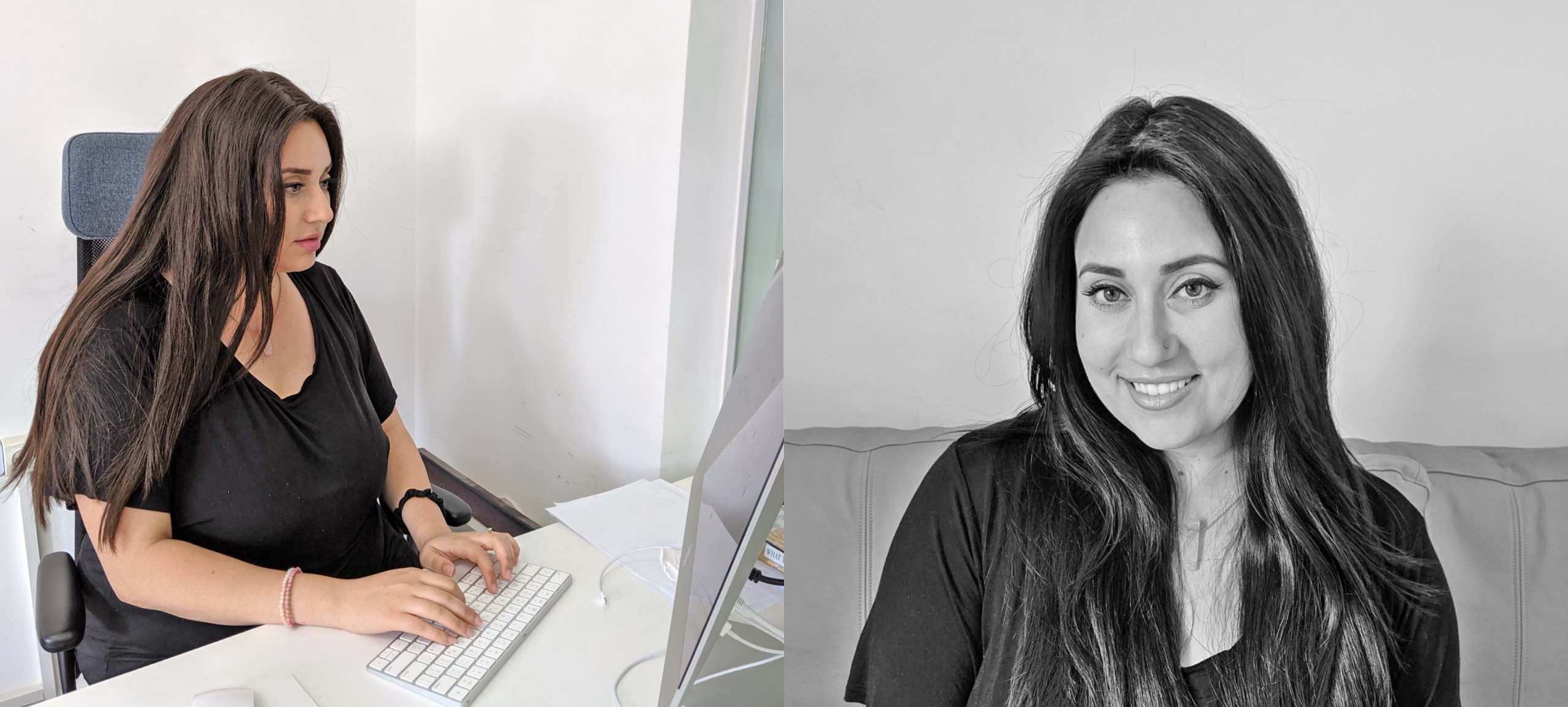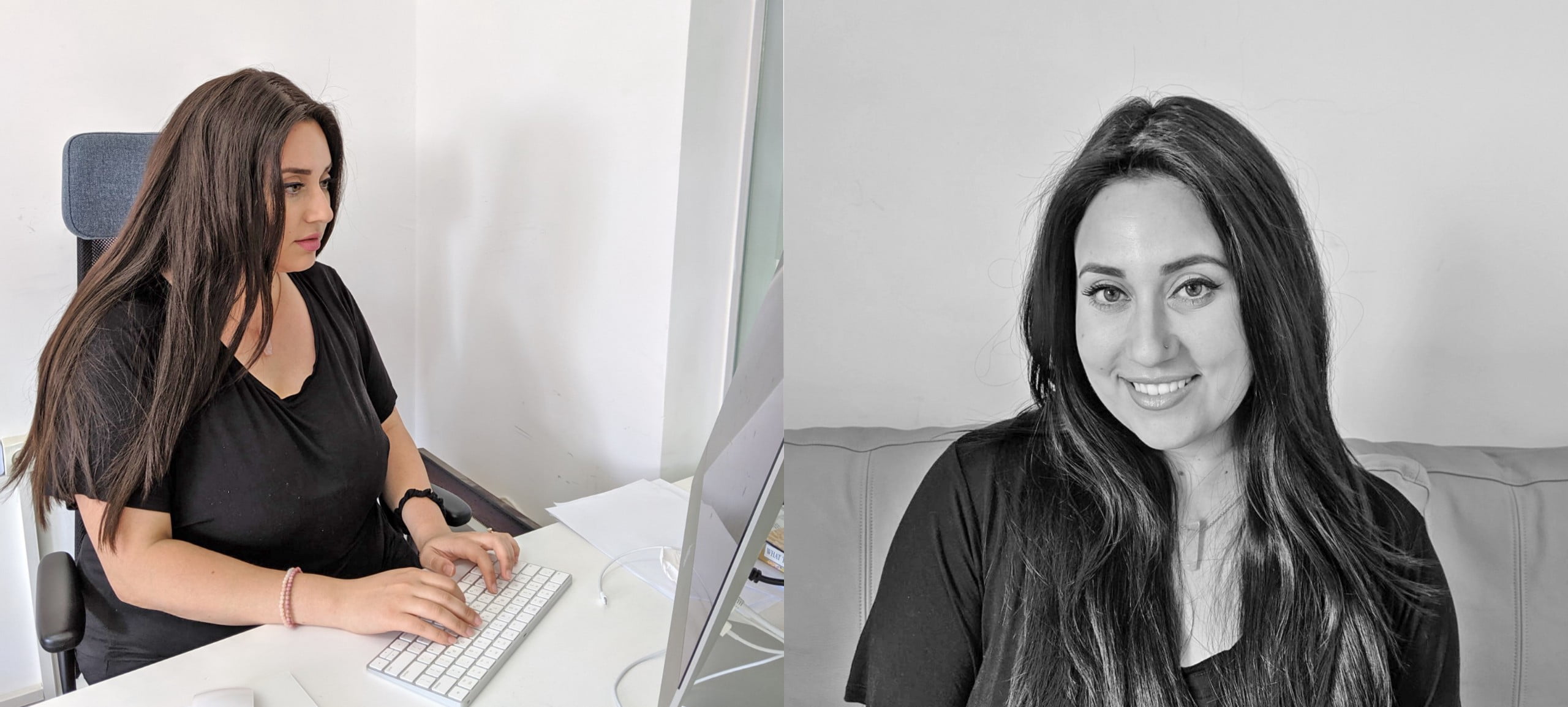
The biggest long-term effect of being shamed online is that you may build up your defenses to prevent getting hurt again. In an attempt to reduce your chances of the disconnection that came from the attack, you’ll create walls to limit your vulnerability. If you don’t attempt to create real connection, you won’t face disconnection. The problem is that without the bad, you also don’t get the good and this can seep into your real-life relationships. A lack of vulnerability inevitability results in a lack of real connections.
As a part of my interview series about the things we can each do to make social media and the internet a kinder and more tolerant place, I had the pleasure to interview Adina Mahalli (MSW). Originally from Toronto, Canada, Adina’s education and travels have led her around the world, learning more about the human condition each step of the way. Adina is a mental health consultant and social media manager at Maple Holistics, a company dedicated to natural and sustainable personal care products. She discovered Maple Holistics when searching for natural health products to implement into her daily routine as a new mother, and was drawn to its natural, health-friendly and holistic vibe. She hasn’t looked back since. Through her combined interests in health & wellness, social media and her experience and education in social work, Adina is dedicated to promoting healthy relationships in and outside of the cyber community. She is devoted to finding balance and developing healthy habits in the realm of social media, mental health, and beyond.
Thank you so much for doing this with us! Our readers would love to “get to know you” a bit better. Can you share your “backstory” with us?
As a teenager growing up in the early 2000’s, I had an avid interest in technology and the vast possibilities of knowledge potentially gained through the internet. At a young age, I saw the infinite potential in connecting with human beings all over the globe, creating change, spreading inspirations and I was immediately hooked. I recently had a baby and have utilized social media as my quick-access support group, and it has been a lifesaver for me, more times than I can count. I connected with many other parents through Instagram especially, and have begun to build an online community centered around my personal journey as a mother and wife, gentle parenting methods, health and spiritual wellness, and creating positive change in our personal lives. Overall, this diverse background has enabled me to grow in more ways than I ever could have imagined.
The realm of social media can be a large and scary world to enter, but I believe in the power of kindness, total inclusivity, and the endless opportunities for healthier connections in the online community. There is so much “undoing” of intolerance and miseducation needed in our world, and I believe that the social media is the best place to start. Today, more than ever, we all have a voice and the opportunity to spread positivity globally.
Can you share the most interesting story that happened to you since you started your career?
A few years ago, I was approached by a teenage girl that was being publicly shamed online. It was not just her, but a whole group of teenagers that had private information about them written on a public forum in an effort to shame and humiliate them. The author was anonymous and signed each post “xoxo, Gossip Girl”. Heartless words of humiliation and exposed secrets that were piercing their young hearts. Between sharing stories of hookups, home problems, break-ups, and homophobic comments, it was an act of pure hostility and hate. Witnessing how mortified this group of students were affects to this day. Not only was sensitive and private information shared about them, but the entire motive behind it was taken from a television show that was specifically targeted to that young and easily-influenced demographic. I experienced this before I gained expertise in social media, or obtained my degree in social work, but the lessons gained from this experience were the ground-work for my belief system. It’s so easy to hurt, shame, or embarrass others on social media as we hide behind our screens and keyboards, but it takes real courage and integrity to hold yourself accountable and be a beacon of kindness and inspiration.
Can you share a story about the funniest mistake you made when you were first starting? Can you tell us what lesson you learned from that?
Well, working in the mental health field has been a journey, to say the least. There were quite a few mistakes made along the way. I’m not sure how funny they were, but I’m learning to look back at these mistakes and smile, knowing that they’ve helped me progress professionally, as well as in my personal life. There are many joys shared within this field, but ultimately, mental health is no laughing matter.
At the end of it all, being in a helping profession is constantly humbling. You are often reminded of how human we all are and how fragile life can be. I have found it vital to stay grounded in the process of being empathetic and altruistic. Listening, being fully present, and holding space for whatever your client is sharing. It’s an opportunity to take a step back, admit to yourself that you are simply an aide to help guide this person to a healthier state of mind, and honoring their personal journey, whatever that may be. Often, the client has the answers within them, and simply need to be reminded of their own hidden strengths.
Are you working on any exciting new projects now? How do you think that will help people?
I truly love creating conscious content. I love connecting, inspiring, being inspired and sharing pieces of my life journey through the online portal. Since becoming part of the Maple Holistics family, my love of natural health products and my love of DIY have fused. So, my new passion project? A YouTube Channel! I cannot wait. I feel lucky to have access to a platform where I can share the importance of online inclusivity, mental health and the power of mindfulness, as well as DIY projects! The possibilities are endless.
Ok, thank you for that. Let’s now jump to the main focus of our interview. Have you ever been publicly shamed or embarrassed on social media? Can you share with our readers what that experience felt like?
Luckily, I have not experienced any public shaming. But unfortunately, I know many who have. It can be absolutely devastating to experience online embarrassment, as the negative message is so quickly and widely spread, that it can result in being cyber-attacked from all directions. Behind the username and the profile picture is a real person, with real emotions, and it’s so easy to feel worn down and defeated by a huge number of faces hiding behind their computer screens, coming at you with all sorts of negative feedback, insults, and hate. Nobody deserves to be publicly shamed, but that is where the immense power of social media shows its uglier side. Over 80% of the developed world’s population uses the internet. The sheer power of that number shows the possibility to spread positivity and raise up this world for the better, or completely destroy lives when that power is misused. The key is not to just change the content we share, whether controversial or vulnerable, but to alter the way we judge others and continue to use our voices to bring about more positive change to the online global community.
What did you do to shake off that negative feeling?
It doesn’t take public shaming to feel a heaviness after using social media. We can be triggered by something we scrolled past without even realizing and that can leave us feeling empty. It happens. The best advice I could give to anyone who experienced online shaming or a negative online experience of any sort is to simply log-off. Take a break, even if just for a few hours. Reconnect with yourself in nature and take a few moments to reflect. The online world is not the only world and it’s important to seek out love and support within your family and friends. If you feel the need, you can always apologize if you feel you did something wrong, delete what you may regret posting, block the trolls and bullies, or just continue on as if nothing happened. But I would stress the importance of not engaging with the ‘haters’, because it will simply drain you emotionally. It’s important to remember that we are only responsible for our own actions, we are not responsible for others’ reactions.
Have you ever posted a comment on social media that you regretted because you felt it was too harsh or mean?
Oh, yes. As a new mother, following lots of other mothers on social media, I come across all sorts of differentiating ideas and ways of parenting. Usually, when I come across something I don’t agree with, I simply see it as the beauty in how different we are and continue on. But, admittedly, I recently did quite the opposite. I came across a body-positive blogger who was openly sharing her journey with loving her postpartum body. A beautiful thing, right? But I made a comment on how body-positivity has turned into a total disregard of health and positive health choices. My comment was not meant in a cruel way at all, in fact, I simply wanted to share how I myself am a huge advocate for body-positivity and positive self-talk, and feel as though a healthy lifestyle of good food choices and moderate exercise is only conducive to a higher rate of positive self-image. What I know now, is that ideology in and of itself is not productive to the world of body-positivity. Body positivity is a movement that advocates for the acceptance of all bodies no matter the form, size, or appearance, period. I now see the importance of researching before pushing your opinion on others. Lesson learned.
Can you describe the evolution of your decisions? Why did you initially write the comment, and why did you eventually regret it?
Sometimes, our ego gets the best of us. We may think we know best or have better ideas than our peers. I believe that is where my comment came from. The reality of life is that people are complex, emotions are complex, and it’s best to remain respectful and composed before pushing your ideas on others.
When one reads the comments on YouTube or Instagram, or the trending topics on Twitter, a great percentage of them are critical, harsh, and hurtful. The people writing the comments may feel like they are simply tapping buttons on a keyboard, but to the one on the receiving end of the comment, it is very different. This may be intuitive, but I feel that it would be instructive to spell it out. Can you help illustrate to our readers what the recipient of a public online critique might be feeling?
For many of us, so much of our lives take place online, which means when you post something, you’re essentially putting a piece of yourself out there for the world to see — and judge. Seeing as social media is predicated on the idea of creating connections, receiving public online critique can forge a sense of disconnection that creates feelings of isolation and low self-esteem, which stem from a place of shame. Disconnection lies at the root of shame since it propagates a sense of not belonging which can be hurtful, traumatic, and distressing. This sort of critique is often uncalled for and unnecessary.
Do you think a verbal online attacks feels worse or less than a verbal argument in “real life”? How are the two different?
The biggest difference between online and verbal attacks in real life is the fact that you probably wouldn’t say what you said in the way you said it when you criticize the person in real life. In this sense, online attacks feel worse than real life attacks because not only is the abuse you’re receiving probably harsher than you’d receive in real life, but it’s also often coming from somebody who doesn’t know you very well and is making sweeping judgments. This enhances feelings of isolation and indignation that come with being the recipient of a public online critique.
What long term effects can happen to someone who was shamed online?
The biggest long-term effect of being shamed online is that you may build up your defenses to prevent getting hurt again. In an attempt to reduce your chances of the disconnection that came from the attack, you’ll create walls to limit your vulnerability. If you don’t attempt to create real connection, you won’t face disconnection. The problem is that without the bad, you also don’t get the good and this can seep into your real-life relationships. A lack of vulnerability inevitability results in a lack of real connections.
Many people who troll others online, or who leave harsh comments, can likely be kind and sweet people in “real life”. These people would likely never publicly shout at someone in a room filled with 100 people. Yet, on social media, when you embarrass someone, you are doing it in front of thousands of even millions of people, and it is out there forever. Can you give 3 or 4 reasons why social media tends to bring out the worst in people; why people are meaner online than they are in person?
Disconnect — As humans, we are naturally empathetic but online communication creates such a degree of separation that this inherent tendency often falls by the wayside. As a result, it’s easy to be hurtful online because you don’t have to look at the other person in the eye and see their pain. It sometimes goes as far as not seeing the victim of the bullying as a person at all. This ‘out of sight out of mind’ mentality has certainly contributed to a huge percentage of the hate posted on the internet.
The Need To Be Right — There’s a well-known adage that “the average man thinks he’s smarter than the average man”, and there’s rarely a clearer place to see this than on social media. Social media tends to bring out people’s mean side because they can make their ‘I’m smarter, better, wittier, *fill-in-the-blank*’ comments without having to address someone in a room filled with countless people. Social media has unfortunately evolved into a platform that perpetuates people’s ability to be ‘right’ without being held accountable. The battle between being right and being kind is completely swept under the rug. If you can be right, why would you be anything else?
Emotional Release — When someone irritates you in real life, you hopefully take a deep breath and deal with it calmly. The anonymity of social media essentially creates an easy release for those frustrations. If you’re not dealing with your real-life frustrations in a healthy way, social media quickly becomes an alternative outlet to provide instantaneous release from any slight annoyance, irritation, or resentment in your life without the fear of getting a black eye, losing your job, etc. You have the ‘space’ to release your frustrations without any repercussions.
If you had the power to influence thousands of people about how to best comment and interact online, what would you suggest to them? What are your “5 things we should each do to help make social media and the internet, a kinder and more tolerant place”? Can you give a story or an example for each?
Mindful Posting — We often spend time thinking and re-thinking our punny or witty Instagram caption before posting. In an attempt to make social media and the internet a kinder, more tolerant place, there’s something to be said for not just thinking about how good your caption is, but also how kind your caption is. Ask yourself if someone is going to be offended by your post. If the answer is yes, you might want to re-think posting it at all. Just look at the rise of the ‘humblebrag’, in which users post a seemingly modest statement that just puts others down and draws attention to something their proud of. A typical humblebrag may read like “’I can’t believe I have nothing nice to wear to the big movie premier tonight’. Simply reading this post from someone else’s perspective would show just how hurtful it can be.
Real Photos By Real People — By editing a selfie to within an inch of its life we perpetuate the idea that ‘perfection’ is the goal. This creates space for body shaming and intolerance of ‘real’ people. However, there’s been a major increase in the awareness and importance of body positivity and ending the cycle of body shaming. The truth is that in an effort to make social media a more tolerant place a lot of the responsibility falls on the parents of the Instagram generation to inculcate their child on the importance of body positivity and how to have a healthy relationship with their image — including what you post online. In practice, this means showing your true colors instead of portraying a virtual stranger.
Silence is Golden — Your online presence should revolve around this familiar adage: If you don’t have anything nice to say, don’t say anything at all. To make social media and the internet a more tolerant place, ask yourself if you’d still say what you’re about to comment in person? When you’re answer is no, rethink your comment.
Sharing Inspiration — There’s nothing wrong with posting that perfectly filtered photo of yourself on vacation, but how much more powerful would it be to create a space of inspiration rather than self-admiration? To make social media and the internet a kinder and more tolerant place try sharing inspiration, motivation, and insights so that others feel empowered instead of insecure.
Arguments — Drama will inevitably go down online and not every argument can be handled face-to-face. Nevertheless, to make the internet a more tolerable place, keep your dispute behind closed doors in private messages. Not everyone needs to witness or partake in your personal dramas. Negativity is toxic, so confine the drama whenever possible to make the internet a more positive place. In reality, there’s no winner in a social media argument and it only strengthens the negative forces so prevalent on the internet.
Freedom of speech prohibits censorship in the public square. Do you think that applies to social media? Do American citizens have a right to say whatever they want within the confines of a social media platform owned by a private enterprise?
I am a big proponent of the freedom of speech and I firmly believe that censoring speech is not the answer we need. Instead of prohibiting certain speech, it’s prudent that we foster an online community which simply doesn’t tolerate hateful ideas. Social media platforms are privately owned so they have the right to censor whatever they deem fit, but that only sends banned users to even more toxic environments.
If you had full control over Facebook or Twitter, which specific changes would you make to limit harmful or hurtful attacks?
I don’t believe censorship is the answer. At best, it’s only a short-term solution to a long-term social problem. Instead, there are two primary ways to curb hurtful content on social media. Firstly, social media platforms could alter their algorithms to promote a healthy information diet while downgrading the value of potentially hateful or rude content no matter how viral it may be. However, this still has its flaws in that it doesn’t alter the culture on social media as a whole. I believe we would see more change by implementing prompts before posting potentially hurtful content. For example, these prompts could include what the user wrote and a gentle alert stating that this could be hurtful. They would then have the option to post it, cancel, or even edit their wording. Similarly, social media platforms could create a 30-second timer on posts, giving all users time to reconsider whether or not they want that content on the internet with the option of cancelling the post. It’s easy to post things rashly with complete disregard to others but these options may be just what someone needs to reconsider their decision and promote a more positive online culture.
Can you please give us your favorite “Life Lesson Quote”? Can you share how that was relevant to you in your life?
Eleanor Roosevelt said that “No one can make you feel inferior without your consent”. This has been my mantra for so long because of its empowering message. There is no shortage of negativity in the world but it doesn’t have to bring you down if you don’t let it. At the end of the day, we are in charge of our own well-being and nobody can take that away. So what if that person has a nice car, richer partner, or better job? It’s up to each and every individual to say that they are happy in their situation even if they want to strive for more. It also means taking responsibility for your accomplishments and owning them. There’s a time and place for humility but not when you have to sacrifice your self-worth.
We are blessed that some of the biggest names in Business, VC funding, Sports, and Entertainment read this column. Is there a person in the world, or in the US with whom you would love to have a private breakfast or lunch with, and why? He or she might just see this if we tag them 🙂
Chrissy Teigen is the first person I’d love to share a brunch with. As a model and television personality, it’s so refreshing to see Chrissy becoming one of the leading voices of the body positivity movement. Not only is she talented and successful, but she is using her public status as a platform for good, which can’t be praised enough. I truly believe she has empowered people all over the world to embrace their true selves which is no small feat. I am particularly impressed by how much of her social media is dedicated to this cause when she has every excuse to promote her own career instead.
How can our readers follow you on social media?
Stay connected and up-to-date with my adventures by following @adinamahalli on Instagram — I would love to connect!
[“source=thriveglobal”]




